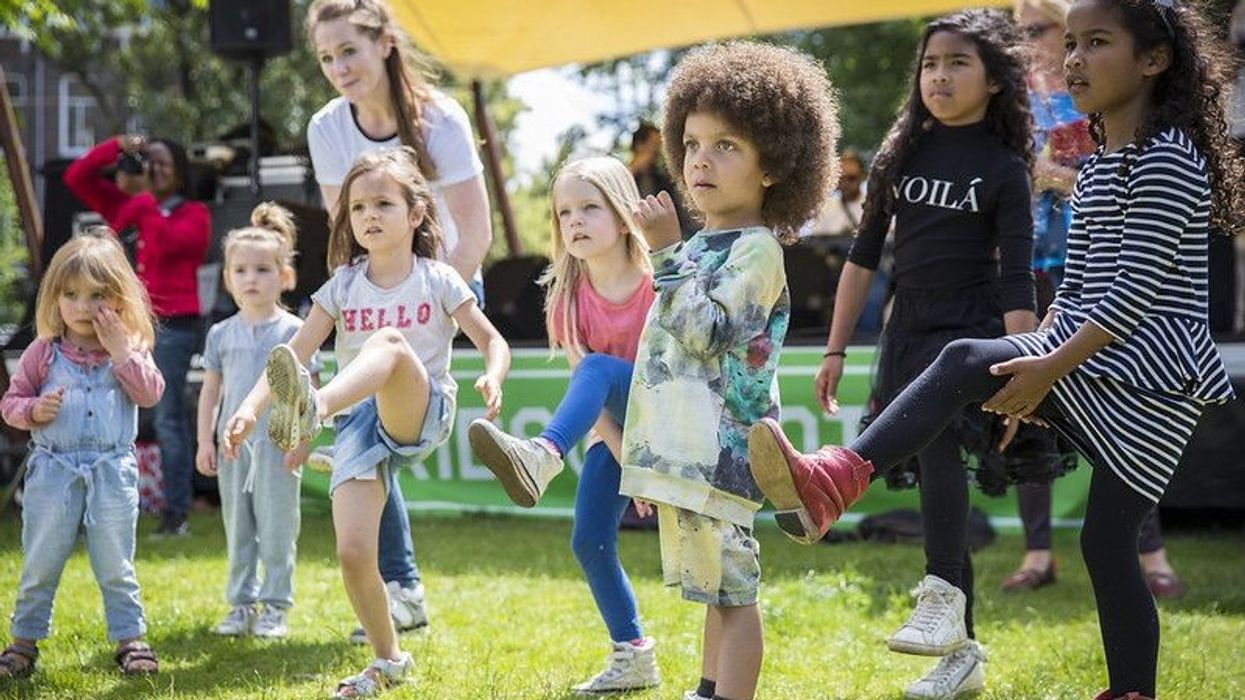How To Grow A Baby From Week 1 Of Pregnancy To 6 Months Old

Finding out you're pregnant can be really exciting but it can also raise lots of questions about what is best for yourself and your baby as the pregnancy progresses.
You might wonder which exercises are still safe (for example, can you run while pregnant?) or whether there are foods to avoid such as goat's cheese and sushi. Then, there may also be more practical queries such as when is best to buy the pram or how many baby bottles you need.
Undoubtedly, there will be a wealth of information that you'll want to find out and you may already have a book or two on the nightstand ready to start reading and some web pages bookmarked on your cell phone.
Of all the information to take in, some of the most important that you need to know is that which concerns nutrition and how this contributes to your developing baby.
In our guide to pregnancy from week one to birth and beyond, you can find out the developments that take place and when, the size of your baby throughout the weeks, and which foods you can eat to help support fetal growth.
First Trimester
The first trimester of pregnancy begins on the first day of your last period and lasts until the end of the 12th week.
As it is difficult to pinpoint when conception occurs, it is always taken as the first day of your last menstrual cycle which means that by the time many women discover they are pregnant, they are already around the six-week mark.
A lot happens in these three months with regards to fetal development so read out to find out more.
The First Four Weeks
This may be slightly difficult to wrap your head around but in the first weeks you are classed as pregnant, you actually aren't.
As most healthcare professionals count 40 weeks gestation from day one of your last period, weeks one to four actually involve the process of your ovaries releasing an egg, the egg traveling down the fallopian tube and into the uterus.
At the point of ovulation, there is a window of around 12 to 48 hours where there is the chance for fertilization by sperm to occur. If fertilization is successful, a zygote is formed and this then starts to rapidly multiply to create a ball of cells called a blastocyst which implants itself into the uterine wall.
At this point, pregnancy hormones start to be created by your body and it is these which are detected by a home pregnancy test.
How Your Baby Is Growing
During the first 12 weeks, your baby is referred to as an embryo and during this trimester it grows more quickly than at any other point during your pregnancy.
After four weeks, the nervous system will begin growing.
By week six, the baby's heartbeat can usually be heard through an ultrasound scan, and come week seven your baby's facial features will start to form, with dark spots indicating where the eyes and nostrils will be and their mouth and ears also starting to form.
In addition, the baby's brain becomes more complex, with nerve cells growing at a rate of 100,000 per minute.
At week nine, your baby's reproductive system will start forming as will other organs including the pancreas.
By the end of these three months, your baby's bones, muscles, and organs will have formed and they will be measuring around 2.5 in (6.35 cm) long, which is roughly equivalent to the size of a passion fruit. Whilst some of your baby's body has started developing, at this point, it still only weighs about half an ounce.
Nutrition And Supplements
The main focus at the beginning of pregnancy is growing a healthy placenta and providing your baby with the right nutrients it needs for its developing organs so there is certainly an incentive now to eat a healthy, varied, and nourishing diet.
What's worth noting, however, is that there is no need to increase your calorie intake at this point as your body's use of calories actually becomes more efficient during pregnancy.
Aim for four to six portions of complex carbohydrates each day. Examples of what such a portion equates to include six tablespoons of cooked pasta, two slices of wholemeal bread, or 5 oz (140 g) potatoes.
In addition, try to get at least five portions of fruit and vegetables into each day's menu.
Fresh fruit and vegetables are better, but most frozen veg also has a good nutrient content.
Eat fruit and vegetables whole and with the skin on as there are lots of nutrients held just under the skin. You'll also want to aim for three portions of dairy such as milk or cheese as well as three portions of protein which can be in the form of meat, fish, or pulses.
With regards to supplements, the main one you'll need to make sure you take is folic acid, which is the man-made version of the vitamin folate. Folate helps your body to make healthy red blood cells and contributes to baby brain development and will help prevent problems with the skull and nervous system.
Second Trimester
In the second of the pregnancy stages, your baby will continue growing and you may also start to feel your baby moving around and feel them turning from side to side.
Up until now, the head has been growing at a quicker pace than the rest of the body but in the second trimester, the torso and limbs start developing more rapidly.
Read on to find out which other developments take place between week 13 and week 26.
Babies Growth Rate
By week 13, your baby will begin to look more human-like as its ears take place on the sides of the head and the eyes will move to the front of the face. In addition, the arms will lengthen to become more proportionate and your baby will be able to stick its thumb in its mouth.
At this time, a creamy white substance called vernix caseosa will start to appear on the fetus to help to protect the fetal skin, which is very thin. At this point, the skin is also wrinkly and red and covered with soft, downy hair.
The vernix will gradually be absorbed by the skin, but some can remain on the baby's skin even after birth.
Excitingly, it is during the second trimester that babies will be able to hear voices so it's common for moms-to-be to talk to the baby in the womb. They will also start to respond to other stimuli and develop reflexes such as sucking and swallowing.
From the fifth month of pregnancy, the baby's brain will undergo the most important period of growth and fingernails also start to grow. By the end of the second trimester, the fetus will measure between 13-16 in (33-40 cm) long and be about the size of a head of lettuce.
What's more, it will weigh somewhere between 2-3 lb (0.9-1.4 kg).

Important Nutrients
Within the second trimester, the focus should still be on a healthy, balanced diet.
That being said, there are some nutrients that are particularly important at this time and will help your baby grow.
These are iron, which helps the blood supply oxygen to the developing baby; calcium, which helps the baby's teeth and bones to form; protein to help the baby's brain and other tissues grow, in addition to the mother's uterus and breasts; folate, which prevents neural tube defects and premature labor; vitamin D for the development of the baby's bones and teeth; and omega 3 fatty acids, which support a healthy brain, heart, nervous system, and eyes in both mother and baby.
Third Trimester
The final trimester of pregnancy begins in week 27 and during these last three months, your baby gains weight quickly as parts of their body continue to fully form.
What Happens To Babies In The 3rd Trimester?
By now, your baby will have started to hiccup every once and a while and you may be able to feel this when it happens. It happens as a result of involuntary diaphragm movements but as the baby's airway is filled with fluid at this point, the hiccup won't actually make a sound!
Up until week 28, your baby's eyes will have been fused shut but they'll now be able to open and close them and they will be a distinct difference between the white of the eyes and the pigmented color of the irises.
In the third trimester, your baby's movements will also become more powerful so you are likely to feel them and even see them through the skin of your stomach.
It is at this time that the portion of the brain responsible for intelligence and personality becomes more advanced.
In the final weeks, now that all the major structures are formed, your baby will need to gain padding to protect its vital organs and help it to regulate its own body temperature once it is born.
You might also find that you feel their movements less now as, having gained approximately half a pound a week, they have less room to maneuver in the womb.
At week 40, your baby is about the size of a pumpkin, measuring approximately 19.6 in (50 cm) from head to heel, and weighing around 7.5 lb (3.4 kg).
Foods To Help Babies Develop In The Last Three Months
As babies need to add fat to their bodies in the last three months, expectant moms can increase their calorie intake by 200-400 calories a day. These additional nutrients will also help you keep your own energy levels up as your due date draws closer.
At this stage of your pregnancy vitamin C, fiber, vitamin K and thiamine are especially important but you should be able to naturally obtain enough of these nutrients if you are eating a balanced, varied diet.
If you want to help boost the amount of these nutrients, fresh fruits contain lots of vitamin C and are also a source of fiber.
For additional thiamine, try incorporating pork, fish, seeds, and nuts into your dishes.
If fiber-filled foods are what you are looking for, opt for those made with whole grains such as bread and cereals as well as fruit and vegetables with the skin left on. For added vitamin K, try leafy green vegetables such as spinach and kale.
0 - 3 Months
After pregnancy, your wait is over and your baby is finally introduced to the world. After nine months of fuelling your body to help the development of your little one, you'll now also need to know how to feed them outside the womb to continue to nourish their body and promote their growth.

How to Grow A Baby After Birth
A healthy baby should only need either breast milk or formula and should not be given water, juice, or any other fluids or solids. Feeding a newborn will be an around-the-clock commitment and they can need feeding up to 12 times a day, or every two to three hours.
Whether you are breastfeeding or formula feeding, you'll need to make sure you keep your own energy levels up by eating nutritious meals as having a newborn is a huge adjustment and you are guaranteed to feel tired. If you are breastfeeding, you'll need around 300 calories more than you were eating pre-pregnancy.
It is also really important to drink plenty of water as if you are dehydrated, you will produce less milk.
A 2-month-old baby will need less frequent feeding and the number of times they need breast or bottle feeding will continue to reduce up until they are three months old.
3 - 6 Months
Throughout the initial three months of your baby's life, you will have established an unbreakable bond and have gotten into a routine. Feeding times will have provided contact and comfort for you both and since birth, they will have continued to fill out.
Infant Development
Whilst babies do develop at different rates, by six months of age a baby should be able to roll onto their front and push themselves up on their forearms to be able to take a look at the world around them.
They should be able to sit with support and may even start to babble and mimic the sounds they hear when others around them talk.
They will use their hands and fingers to explore their surroundings and will also develop facial expressions.
To help their cognitive and physical development at this stage, make sure they have a range of tactile, sensory toys to play with and talk to them regularly, trying a range of tones, sounds, and songs.
Feeding Babies
At this age, babies can still be breastfeeding but as it isn't as frequently as when they were newborn, they may be able to be left with a family member for a few hours whilst you have a rest. You could also try expressing so that they can be fed a bottle of breastmilk by another person.
At around six months, your baby has grown up enough that for you to start weaning with small amounts of solid food such as some blended carrot, apple puree, or soft, cooked sticks of yam. You could also try baby rice, made with your baby's usual milk.
You should look for signs from your baby that they are ready to move onto solid foods. These signs include being able to hold their head steady whilst sitting, being able to swallow food, and being able to pick up food by themselves and put it in their mouths.
Doing this shows that they are able to coordinate their eyes, hands, and mouth.
You can also start to introduce other foods but it is important that you do this one at a time so you can keep an eye out for any allergic reactions. Examples of such foods include cow's milk, eggs, and fish.
If at any point during pregnancy or after the birth of your child you are concerned about your nutrition or their feeding, don't be afraid to talk to a health advisor or your doctor. They should be able to put your mind at rest, give you some valuable tips and point you in the direction of additional resources.
If you found this article helpful, then why not take a look at what having no morning sickness means or what morning sickness at night means?
We Want Your Photos!
More for You
See All
Bachelor of Science specializing in Mass Communication.

Adekunle Olanrewaju JasonBachelor of Science specializing in Mass Communication.
Disclaimer
1) Kidadl is independent and to make our service free to you the reader we are supported by advertising. We hope you love our recommendations for products and services! What we suggest is selected independently by the Kidadl team. If you purchase using the Buy Now button we may earn a small commission. This does not influence our choices. Prices are correct and items are available at the time the article was published but we cannot guarantee that on the time of reading. Please note that Kidadl is a participant in the Amazon Services LLC Associates Program, an affiliate advertising program designed to provide a means for sites to earn advertising fees by advertising and linking to Amazon. We also link to other websites, but are not responsible for their content.
2) At Kidadl, we strive to recommend the very best activities and events. We will always aim to give you accurate information at the date of publication - however, information does change, so it’s important you do your own research, double-check and make the decision that is right for your family. We recognise that not all activities and ideas are appropriate for all children and families or in all circumstances. Our recommended activities are based on age but these are a guide. We recommend that these ideas are used as inspiration, that ideas are undertaken with appropriate adult supervision, and that each adult uses their own discretion and knowledge of their children to consider the safety and suitability. Kidadl cannot accept liability for the execution of these ideas, and parental supervision is advised at all times, as safety is paramount. Anyone using the information provided by Kidadl does so at their own risk and we can not accept liability if things go wrong.
3) Because we are an educational resource, we have quotes and facts about a range of historical and modern figures. We do not endorse the actions of or rhetoric of all the people included in these collections, but we think they are important for growing minds to learn about under the guidance of parents or guardians.







